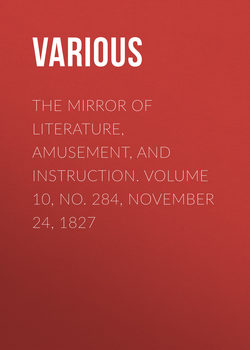Читать книгу The Mirror of Literature, Amusement, and Instruction. Volume 10, No. 284, November 24, 1827 - Various - Страница 4
NAVARINO AND THE ISLAND OF SPHAGIA
HORSE-CHESTNUTS
Оглавление(To the Editor of the Mirror.)
In a recent number there was a notice of the uses of the Esculus Hippocastaneus, or horse chestnuts; but a very important one was omitted, namely, its substitution occasionally for Peruvian bark in cases of intermittent fever. This disorder, known better by the name of ague, had been formerly epidemic in Ireland, where the humidity of the atmosphere is continually increased by the exhalation of the lochs and bogs with which the country abounds. In consequence, however, of the formation of the Grand and Royal Canals, and the drainage of the waters in their vicinity, the tendency to this disease was greatly lessened; and about twenty years ago the disorder was so rare in Dublin and the neighbourhood, that the medical students often complained that they graduated without ever having an opportunity of seeing in the hospitals a single case of this once almost universal disorder. In consequence, however, of the extreme wetness of one summer and autumn, agues again resumed their ascendancy, and the hospitals and dispensaries became crowded with intermittent patients, and all the bark of the druggists and apothecaries was put into requisition; but to the surprise and disappointment of all the medical men, this infallible specific was altogether inert and powerless, and after repeated trials and disappointments, it was abandoned as useless. It was now a matter of importance to ascertain the cause of this extraordinary failure, whether it arose from the altered character of the complaint, or from the deteriorated quality of the medicine; and it was found to be the latter. In consequence of the long cessation of intermittent fever, bark had been little used or called for, and the stock had remained so long on hand, that it had become effete and worthless. It was necessary then to try some substitute. Quassia-wood, the acorus calamus, and other bitters and aromatics, were tried; but that which seemed to succeed best was the bark and kernel of the horse-chestnut. The nut was moderately dried in a stove, so as to be capable of being powdered, and in that state was exhibited in substance with cayenne pepper and other aromatics. The bark was taken in infusions and decoctions with quassia, and the effects were sometimes very decided and satisfactory, forming a providential substitute for the only kind of bark then to be procured in Ireland.
W.
